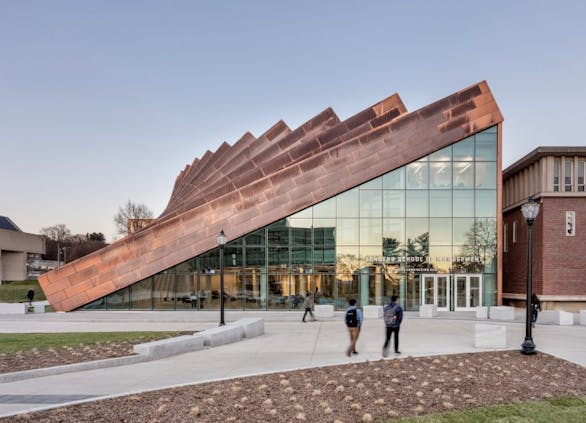
The University of Massachusetts Amherst’s MBA/MS Sport Management and MS Sport Management moves into its 51st year in 2021-22 and marks it by placing top of the 2022 Postgraduate Rankings. Having achieved the same feat in 2019, the programme dropped one place in 2020 and finished second again in 2021 but returns to first position this time round.
Celebrations of the course reaching its half-century mark in the last year were slightly delayed due to the pandemic but the recently concluded summer saw the University hold three days of events in June to mark the anniversary. This included the welcoming back to campus of over 125 alumni and dignitaries of the programme.
As well as representing the 50th anniversary of the course’s inception, 2021-22 saw Will Norton move into the role of graduate programme director, taking the reins from Steve McKelvey, who held the role for the previous 13 years. McKelvey retains an influence on the programme as head of the Mark H. McCormack Department of Sport Management at UMass. Dr. Nicole Melton is also instrumental to the programme as Associate Department Chair.
The overall number of full-time faculty working on the programme rises to 13 for the upcoming academic year, with Katie Sveinson joining as assistant professor of sport management. Sveinson’s research has focused on the areas of marketing and consumer behaviour, specifically as it pertains to women sport fans and culture/cultural production of sport fandom. Yiran Su also joins as assistant professor of sport management and provides a research background in digital marketing and applied technology, with interests in identity-based digital consumption, the relationships between technology, sports, and wellbeing, and brand-consumer interaction in the digital and virtual space, such as Web 3.0.
The typical size of cohort on the dual MBA/MS programme ranges from 22 to 30, with applicant rates typically at about 125. On average, the university fully funds at least 50 per cent of each student’s tuition cost and almost all students are members of a union via their graduate assistantships, which provides income and health insurance during their time on the course.
Integrated within the University’s Isenberg School of Management, the course is centred on experiential learning, with the aim of providing students with a holistic view of the sports industry.
The inter-departmental research labs, based within the McCormack Department and focused on areas such as sport rivalry and diversity and inclusion within sport, are seen as a provider of competitive advantages to graduates of the programme by its leadership. Graduate students work directly with the research labs to contribute to work with external organisations including the Wasserman agency and Japan’s Pacific League.
The data from the 2022 Postgraduate Rankings survey indicates the programme to be particularly strong across metrics such as employability and quality of faculty. This year, the programme was also the only example of an institution which had graduates progress into positions within the Research & Analysis category. Part of the reason for this may be that students on the programme are provided support with industry placement in sports agency consulting, market research analyst, and business intelligence positions, while classes such as Sport Market Research and Sports Analytics teach students to apply proper research methodologies to a given business problem.
This article is part of the 2022 SportBusiness Postgraduate Rankings. To browse the entire report and view the overall tables, click here.